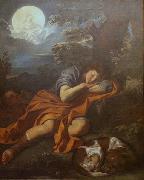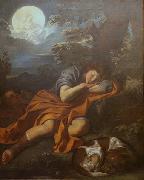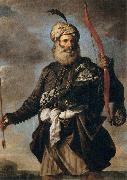Pier Francesco Mola Olja Måleriet ReproduceringAll Pier Francesco Mola Oil Paintings(9 February 1612 - 13 May 1666) was an Italian painter of the High Baroque, mainly active around Rome. Mola was born at Coldrerio (now in Ticino, Switzerland). At the age of four, he moved to Rome with his father Giovanni Battista, a painter. With the exception of the years 1633 - 40 and 1641 - 47, during which he resided in Venice and Bologna, respectively, he lived for the rest of his life in Rome. His early training was with the late mannerist painter Cavalier D'Arpino, and he worked under the classicizing Francesco Albani. His masterpiece is the fresco in the gallery of Alexander VII in the Quirinal Palace Gallery, entitled Joseph making himself known to his Brethren (1657). He made six versions of The Flight into Egypt, the earileist and best of which is the first one, The Rest on the Flight into Egypt. He was elected Principe of the Accademia di San Luca, the Roman artists' professional association, in 1662, but his last years were neither profitable nor prolific. One of his pupils was Antonio Gherardi. With his looser style and handling, more naturalistic palette, and interest in exploring landscape elements, Mola rebelled against the prevailing, highly-theoretical classicism of such leading 17th-century Roman painters as Andrea Sacchi. |
|||

|
|||
|
|
|||
|
||||||||
| Pier Francesco Mola (9 February 1612 - 13 May 1666) was an Italian painter of the High Baroque, mainly active around Rome. Mola was born at Coldrerio (now in Ticino, Switzerland). At the age of four, he moved to Rome with his father Giovanni Battista, a painter. With the exception of the years 1633 - 40 and 1641 - 47, during which he resided in Venice and Bologna, respectively, he lived for the rest of his life in Rome. His early training was with the late mannerist painter Cavalier D'Arpino, and he worked under the classicizing Francesco Albani. His masterpiece is the fresco in the gallery of Alexander VII in the Quirinal Palace Gallery, entitled Joseph making himself known to his Brethren (1657). He made six versions of The Flight into Egypt, the earileist and best of which is the first one, The Rest on the Flight into Egypt. He was elected Principe of the Accademia di San Luca, the Roman artists' professional association, in 1662, but his last years were neither profitable nor prolific. One of his pupils was Antonio Gherardi. With his looser style and handling, more naturalistic palette, and interest in exploring landscape elements, Mola rebelled against the prevailing, highly-theoretical classicism of such leading 17th-century Roman painters as Andrea Sacchi. |
||||||||
|
|
||||||||
| Måleriet Identifieringen :: 80732 Diana and Endymion Date ca. 1660(1660) Medium Oil on canvas cjr |
||||||||
|
|
||||||||
| Måleriet Identifieringen :: 84916 Diana and Endymion . 1660(1660) Medium Oil on canvas cyf |
||||||||
|
|
||||||||
| Måleriet Identifieringen :: 96306 Oriental Warrior 1650(1650) Medium oil on canvas cyf |
||||||||
|
|
||||||||
|
| FÖREGÅENDE KONSTNÄR Nästa Konstnär | |||||||
|
|
||||||||
|
Pier Francesco Mola (9 February 1612 - 13 May 1666) was an Italian painter of the High Baroque, mainly active around Rome. Mola was born at Coldrerio (now in Ticino, Switzerland). At the age of four, he moved to Rome with his father Giovanni Battista, a painter. With the exception of the years 1633 - 40 and 1641 - 47, during which he resided in Venice and Bologna, respectively, he lived for the rest of his life in Rome. His early training was with the late mannerist painter Cavalier D'Arpino, and he worked under the classicizing Francesco Albani. His masterpiece is the fresco in the gallery of Alexander VII in the Quirinal Palace Gallery, entitled Joseph making himself known to his Brethren (1657). He made six versions of The Flight into Egypt, the earileist and best of which is the first one, The Rest on the Flight into Egypt. He was elected Principe of the Accademia di San Luca, the Roman artists' professional association, in 1662, but his last years were neither profitable nor prolific. One of his pupils was Antonio Gherardi. With his looser style and handling, more naturalistic palette, and interest in exploring landscape elements, Mola rebelled against the prevailing, highly-theoretical classicism of such leading 17th-century Roman painters as Andrea Sacchi. |
||||||||
|
|
||||||||
|
KOMMA I KONTAKT MED Oss |








